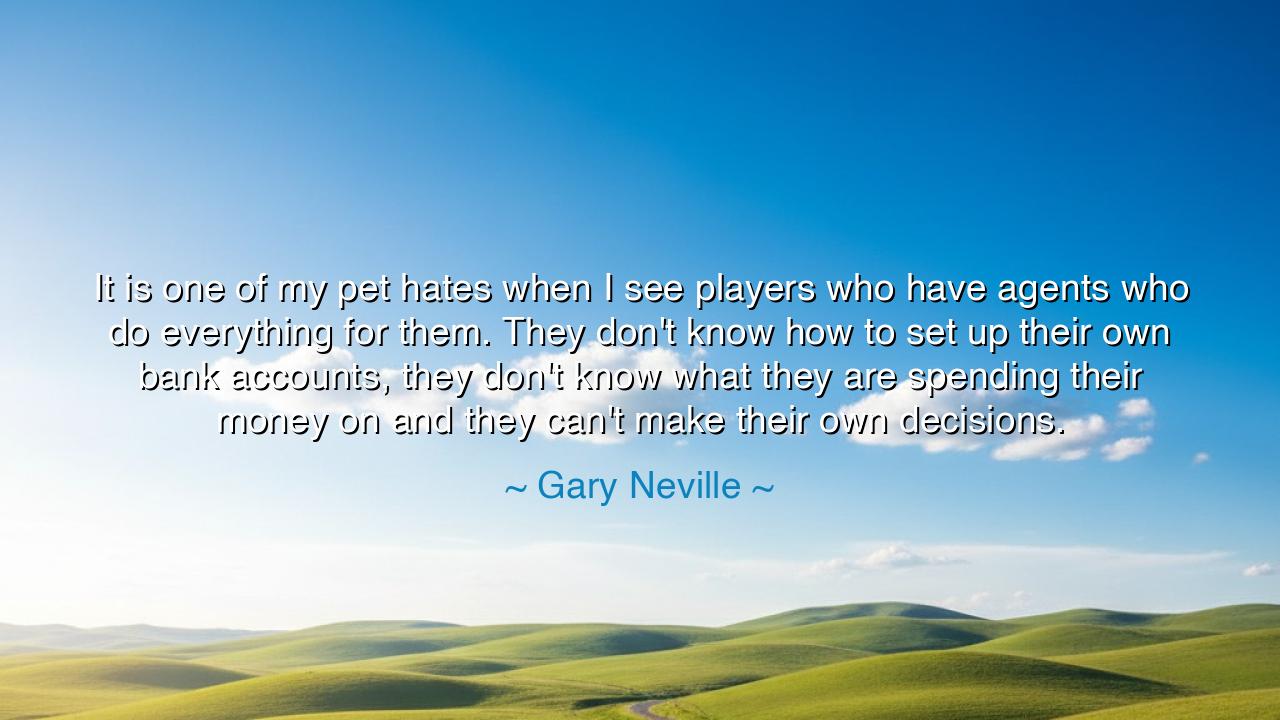
It is one of my pet hates when I see players who have agents who
It is one of my pet hates when I see players who have agents who do everything for them. They don't know how to set up their own bank accounts, they don't know what they are spending their money on and they can't make their own decisions.






Hear the stern words of Gary Neville, forged in the fires of discipline and experience: “It is one of my pet hates when I see players who have agents who do everything for them. They don’t know how to set up their own bank accounts, they don’t know what they are spending their money on and they can’t make their own decisions.” Though spoken of the sporting world, these words reach far beyond the field of play. They speak of self-reliance, of responsibility, of the sacred duty every man and woman bears to master their own affairs, lest they become children in a world that demands maturity.
Neville’s frustration is not simply with the agents, but with the surrender of the players. To entrust another with all decisions, to remain ignorant of one’s own money, to shy away from the small duties of adulthood, is to invite weakness. A man who cannot set up his own bank account is a man unprepared for the storms of life. A woman who does not know her own spending is vulnerable to ruin. Neville’s words burn because they are not about convenience, but about the erosion of independence.
The ancients knew this truth well. The philosophers of Greece and Rome taught that the free citizen must be master of himself—capable of choosing wisely, governing his passions, and managing his household. To surrender these tasks to others was to become a slave in all but name. The Stoic Epictetus declared that liberty comes not from wealth or privilege, but from control over one’s own mind and actions. What Neville laments is the modern echo of this ancient principle: the tragedy of men with strength in their limbs but weakness in their judgment.
History offers many examples of ruin born from this neglect. Consider the emperors of late Rome, many of whom were shielded by advisors and flatterers, kept ignorant of the empire’s true affairs. Though crowned with power, they were children in wisdom, unable to act without the will of others. Their empires crumbled not from lack of armies, but from lack of leaders who knew how to make their own decisions. Likewise, Neville warns that athletes who live in ignorance may find their riches vanish, their careers wasted, their futures unprepared.
Yet his words also carry hope. For he does not say that players are doomed, only that they must awaken. To learn to handle one’s own accounts, to watch over one’s money, to practice making decisions—these are skills that can be learned, habits that can be formed. The call is to growth, to maturity, to independence. It is not enough to excel in sport, or in any craft; one must also excel in the art of living, lest one’s greatness be undermined by folly.
The lesson here is sharp: do not yield your life into the hands of others, no matter how capable they may seem. Guides and mentors are good, but they must not replace your own judgment. An agent may negotiate, a teacher may advise, a parent may guide—but in the end, the decisions must be yours. To walk blindly behind another is to live not as an adult, but as a dependent child. To stand firm in your own knowledge is to be free.
Practically, this means: learn the fundamentals of your life. Know how to earn, how to save, how to spend wisely. Make your own choices, even small ones, with care. Do not avoid responsibility, but embrace it, for in it lies strength. Ask for help, yes, but do not surrender your authority. For the measure of a person is not in how much they possess, but in how much they can govern themselves.
Therefore, O seekers of wisdom, let Neville’s words be a rebuke and a guide. Do not become like the pampered players who cannot even hold their own lives in their hands. Be like the ancients, who prized discipline and independence above luxury and ease. For wealth without wisdom is a curse, and strength without judgment is ruin. Learn, then, to master your own affairs, and you will stand not only as athlete or laborer, but as ruler of yourself—a king or queen over the kingdom of your own life.






AAdministratorAdministrator
Welcome, honored guests. Please leave a comment, we will respond soon